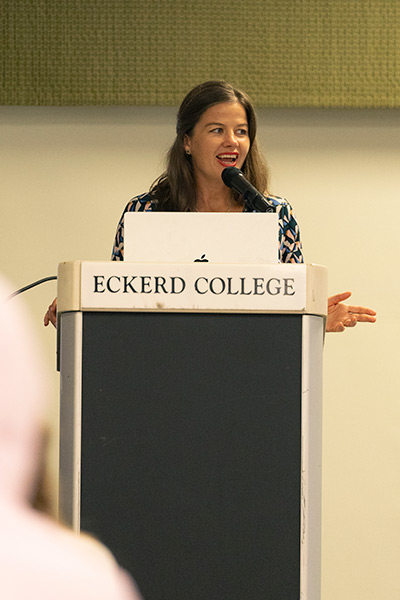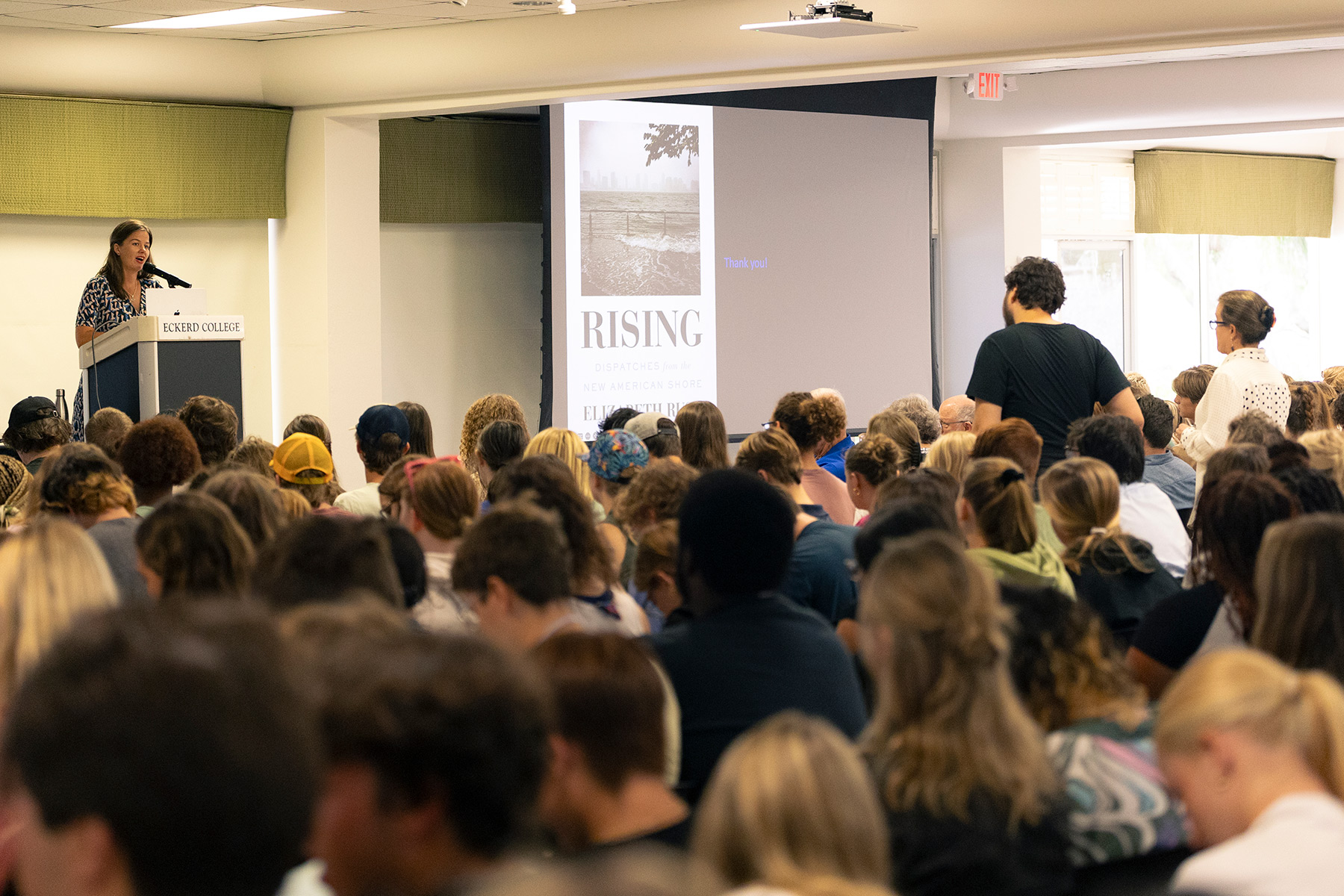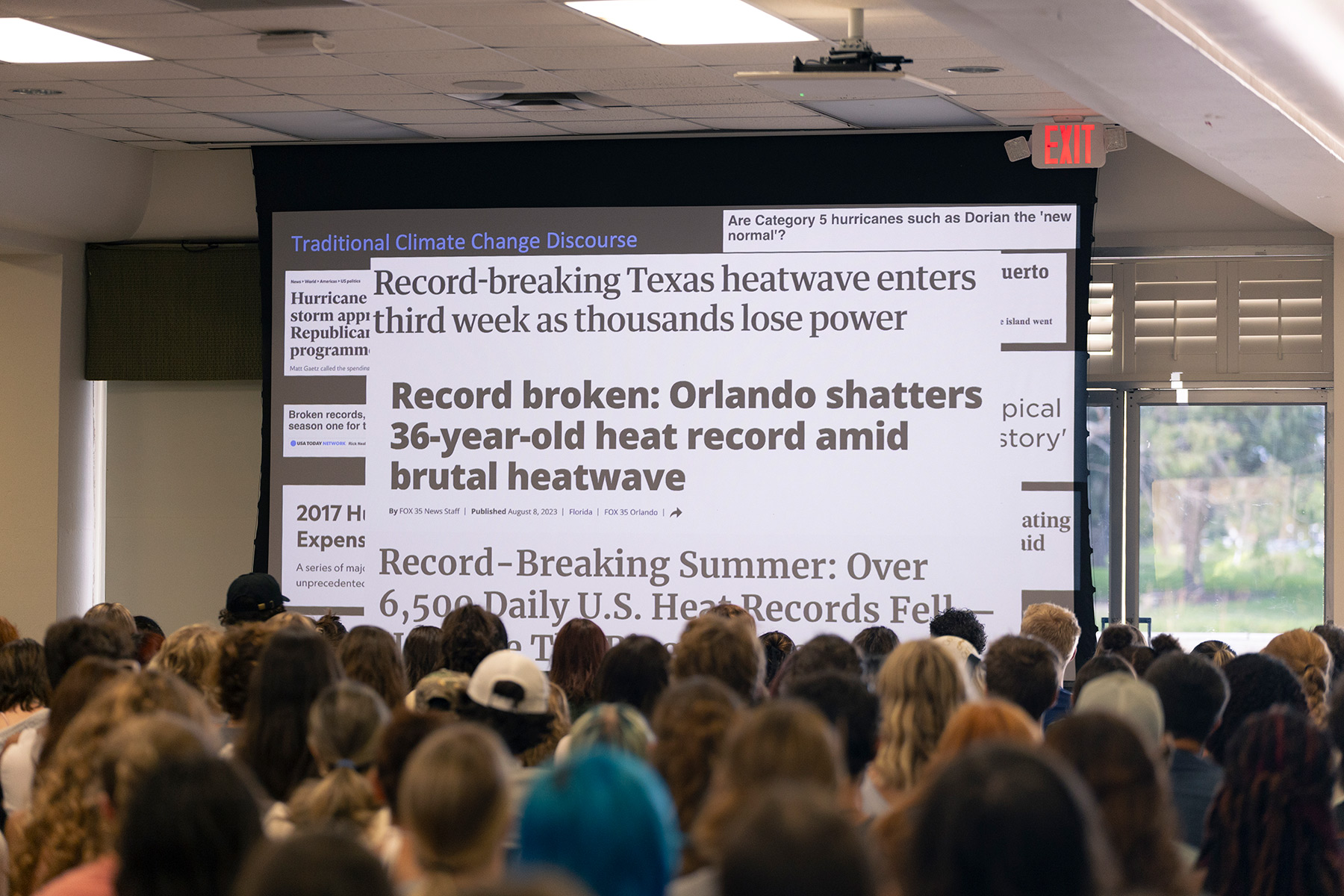In 2019, author Elizabeth Rush spent two and a half months onboard a giant icebreaker ship traveling through the Antarctic. She and 57 crew members and researchers were on an expedition to study Thwaites Glacier, which is roughly the size of the state of Florida.
Thwaites is of particular interest because if it melts, Florida will see 10 feet of sea level rise across its landscape.
“This is a map of what this area would look like if the sea level rose 10 feet,” Rush told a room full of students, faculty, staff and alumni at Eckerd College on Sept. 5. The blue coloration on the familiar map of St. Petersburg showed Eckerd’s campus entirely underwater. Gasps filled the room as our community realized how deeply connected we are to Thwaites. In the wake of Hurricane Idalia, the threat of this kind of flooding was all too easy to imagine.
Over the summer, first-year and senior students engaged with Rush’s Rising: Dispatches from the New American Shore (Milkweed Editions reprint edition, 2019) as this year’s Summer Reading book followed by the author presentation sponsored by Eckerd’s Class of 1968. Rush visited a crowd of hundreds in Fox Hall to share observations from her latest book as well, The Quickening: Creation and Community at the Ends of the Earth (Milkweed Editions, 2023), and its relevance to the geography of Florida’s Gulf Coast.

“A recent study shows Thwaites’s meltwater will end up in the Gulf,” Rush said.
An important aspect of Rush’s work is the deep connection between science and impact. The people she interviews are directly impacted by the science of climate change, much like we are at Eckerd. She helps the public understand the complex intersections of race, class, gender and climate change in coastal communities. Rush is a character in her books, which creates a sense of intimacy with her readers, helping them feel less alone.
In her new book, Rush uses birth as a recurring metaphor for the glacier; glaciers give birth to icebergs. There is a pull between creation and destruction in both human and geological scenarios. During this talk, she played an audio clip from the birth of her son, vulnerable screams layered with the voice of a panicked father. During the clip, women in the room chuckled and nodded. A man in the crowd leaned to his neighbor to ask, “Oh, remember those?”
“Readers are voyeurs,” Rush said. “They find pleasure in a stranger’s birth cry. I used that pleasure to draw attention to this massive scientific issue that involves all of us.”
Rising is a work of creative nonfiction, combining the styles of informative environmental facts and personal narratives concerning the sea level rise our coast has experienced over the last several decades. It focuses on a theme of resilience, turning its readers’ eyes to the communities and individuals living with the consequences of rising sea levels due to climate change.
After her talk, Rush opened the floor for questions. Eckerd students lined the aisles, waiting for their turn at the microphone. Each of them asked thoughtful and intentional questions about Rush’s research experiences, writing expertise and suggested actions.
“How do you stay hopeful?” asked Ivy Sanborn, a senior animal studies student from Bar Harbor, Maine.
Rush paused before conjuring an answer. “My heart and mind go in several directions when I get this question … I engage with hope as an action more than an emotion. In order to engage with hope, we must make it.”
Rush has learned a lot about climate change in the 12 years she’s been writing about it. And yet, she said she still experiences “deep spells of grief and mourning.” Those periods of sorrow are often gateways to the action of hope.
First-year student Milena Lynch from Winter Garden, Florida, wondered what moment sparked Rush’s passion for climate change. At age 22, Rush took a solo bicycle trip to Alaska and enjoyed the world as herself, with no concern for her relationship to anyone else. Writing has brought more of those opportunities to experience a self that is “not sexed.” A passion for that self led to a passion for the climate crisis because Rush simply followed what she loved.
“I aspire to write like you one day,” Milena told Rush, who accepted the compliment with a wave of gratitude.














